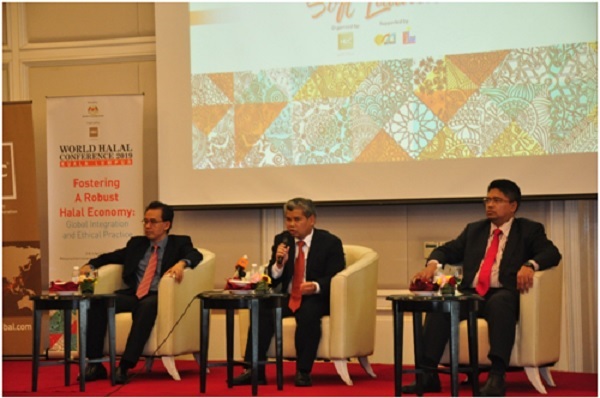
by admin | May 25, 2021 | Business Summit, Events, Halal Food, Halal Industries, Halal Medicine
KUALA LUMPUR – The 11th World Halal Conference 2019 (WHC 2019) is one of the Government’s concerted efforts to propel the international growth of the halal industry, and to make Malaysia a thought leader in the development of Halal industry. Organised by the Halal Industry Development Corporation (HDC) and hosted by Ministry of Economic Affairs, Malaysia, WHC 2019 converges more than one thousand Government representatives, business leaders, halal industry players, entrepreneurs, scholars and stakeholders from all over the world to explore the potential and deliberate on challenges relating to the development of the halal economy.
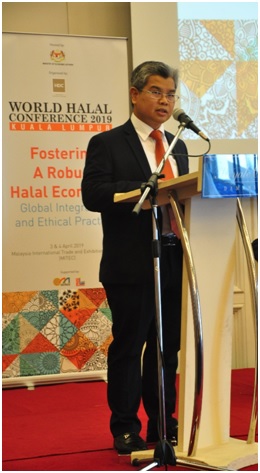
Mr. Hanisofian Alias, Vice President Industry Development of HDC
The conference and parallel sessions will be held on 3 & 4 April 2019 at Malaysia International Trade and Exhibition Centre (MITEC), Kuala Lumpur, Malaysia. The media announcement today is led by Mr. Hanisofian Alias, Vice President Industry Development of Halal Industry Development Corporation (HDC).
Halal industry has always been of paramount importance to Malaysia as a Muslim-majority country. The Muslim population worldwide translates into a rising international demand for Halal products and services. Halal is accepted as a truly global industry and this ever-increasing globalization represents a vibrant opportunity for the global economy.
However, it also presents a number of challenges, to do with international attitudes and rapid technological change; and it entails important responsibilities concerning the ethical governance of the halal industry and its harmonised regulation worldwide.
Building on this premise, this year WHC 2019 will feature the theme ‘Fostering a Robust Halal Economy: Global Integration and Ethical Practice’ to explore opportunities and challenges through series of discourses aimed at integrating technological advancements, ethical governance and emerging market, through a plethora of topics on the progressive impacts the Halal Economy offers during the sudden borderless surge in global integration and within the technological industrial revolution.
The two-day conference will be packed with multi-level discourse addressing various opportunities and challenges in the Halal industry championed by YB Dato’ Seri Mohamed Azmin bin Ali, Minister of Economic Affairs Malaysia:
- Ambassadors Session : Leveraging the Halal Industry to Boost Global Integration
- Ministerial Panel : Global Halal Economic Revolution
- Captains of Industry Panel : Global Halal Industry in 2030 – A Vision
- Contribution of Islamic Finance Towards Halal Economic Growth
- Shaping A Sustainable Halal Ecosystem
- Shaping The Future of Halal Healthcare
- Emerging Halal Sector Outlook
This year’s conference saw strategic collaboration of several partners including, Duopharma Biotech Berhad, Nestle Malaysia , McDonalds Malaysia, Echo Foxtrot Sdn Bhd (Bungkus by Honestbee), Salam Web Technologies MY Berhad, Malaysian Investment Development Authority (MIDA), Hong Leong Islamic Bank and Association of Islamic Banking and Financial Institutions Malaysia (AIBIM).

From left; Ainul Azman Ainul Jamal, Vice President, Corporate Services, HDC, Hanisofian Alias, Vice President, Industry Development of HDC and Hairol Ariffein Sahari Vice President, Strategic Planning and Monitoring, HDC
“We are honoured to see such strong commitment from our industry partners, together with the participation of foreign delegates and renowned speakers who will make this year’s conference a success. We urge for their continuous support; together we can take the Halal Industry to new heights, both internationally and locally,” said Mr. Hanisofian Alias.
On Malaysia’s halal performance, he announced that the country’s total halal export value in 2018 amounted to RM40.0 billion, a decrease of RM3.3 billion (7.6%) from the previous year. The halal sectors saw a setback in exports in overall cluster with the exception of the cosmetics and personal care.
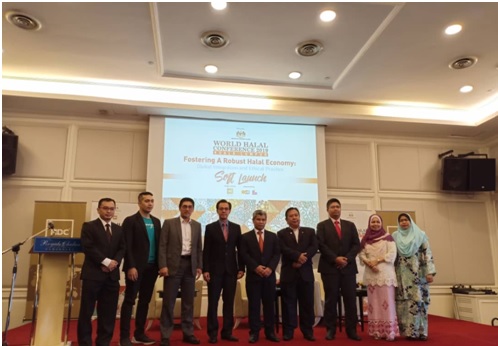
This year’s conference saw strategic collaboration of several partners including from left, Hong Leong Islamic Bank, Echo Foxtrot Sdn Bhd (Bungkus by Honestbee), McDonalds Malaysia, Ainul Azman Ainul Jamal, Vice President, Corporate Services, HDC, Hanisofian Alias, Vice President, Industry Development of HDC, Nestle Malaysia, Hairol Ariffein Sahari Vice President, Strategic Planning and Monitoring, HDC, Salam Web Technologies MY Berhad, Association of Islamic Banking Financial Institutions Malaysia (AIBIM).
Overall, the reduction in halal exports last year were largely contributed by two halal clusters represented by a 50.0% (MYR1.8 billion) decline in palm oil derivatives from MYR3.6 billion the year before and 36.7% drop in industrial chemicals to MYR357.77 million in 2018 from MYR563.54 million previously.
The top importers of Malaysia’s halal products were led by Singapore (RM4.6 billion); China (4.5 billion); Japan (RM2.5 billion); the United States (RM2.4 billion); and Indonesia (RM1.9 billion).
Although it was a challenging period, Malaysia remains resilient and continues to thrive, capable of withstanding these challenges, and progress forth as a Global Halal Hub aspirant through sustainable Halal ecosystem approach related in the Halal Industry Master Plan 2019-2030 (HIMP2.0).
ABOUT HALAL INDUSTRY DEVELOPMENT CORPORATION (HDC)
The Halal Industry Development Corporation (HDC) was established on 18 September 2006 with the express objective of coordinating the overall development of the Halal industry in Malaysia for both the domestic and international markets. HDC is an agency under the Ministry of Economic Affairs, Malaysia (MEA).
HDC is Malaysia’s holistic response to the worldwide demand for better quality products and services as consumers gain confidence in the Halal process. Its key thrusts are to grow and advance the development of Halal standards; facilitate capacity- building for Halal products and services; and promote growth and participation of Malaysian companies in the multi-trillion dollar global Halal market and industry. Today, there is an estimated population of 1.8 billion Muslims worldwide. The global Halal market is currently estimated at USD2.3 trillion covering both food and non-food sectors.
In its effort to serve as an international hub for the Halal industry, HDC provides manufacturers, distributors, retailers, entrepreneurs, researchers and investors with comprehensive assistance to penetrate and serve a growing global Halal market through the adoption of the Malaysian experience and expertise in food and non-food sectors. For more information, please visit HDC at www.hdcglobal.com.

by admin | May 25, 2021 | Halal Industries

Halal Expo Australia
 By Zia Ahmad
By Zia Ahmad
The fourth Halal Expo Australia was held on Saturday 10 and Sunday 11 February 2018 at Rosehill Gardens in Sydney showcasing a large number of trade shows displaying their halal products and services.
The expo was opened by the Mufti of Australia, Dr Ibrahim Abu Mohammed and the parallel Halal Conference was addressed by a number of local and international experts in halal industry as well as Mr Ray Williams, NSW Minister for Multiculturalism.

The expo was opened by the Mufti of Australia, Dr Ibrahim Abu Mohammed
First started in 2015 at Fairfield Showground in Western Sydney, at the peak of the anti-halal movement by a small minority of racists and bigots, the Halal Expo Australia has grown into a highly successful international yearly iconic event.
The Halal Expo organising team led by Mr Syed Atiq ul Hasan, an award winning journalist, community worker and event organiser persevered against all opposition by anti-halal bigots and remained steadfast in promoting and showcasing halal concepts in Australia.

Halal Expo Australia
Mr Hassan, using his skills of networking, outreach and inclusive approach has brought together a diverse range of sponsors, local and international, halal experts, businesses engaged in halal products and services over the short span of three years to develop the expo into an iconic mega-event.
The Halal Expo Australia 2018 included halal trade shows covering a variety of Halal Products & Services from Food & Beverage; Finance, Investment & Banking; Arts & Culture; Fashion, Cosmetics & Accessories; Beauty & Health Products; Lifestyle & Wellness; Pharmaceutical & Herbal Products to Building Private & Commercial Projects; Travel, Tourism & Hospitality; Innovation & Technology; Education, Research & Development.
Parallel to the trade show, a 2-Day International Halal Conference (IHC) was held providing a unique opportunity for the local and overseas Halal industry players, Halal certification bodies, Islamic leaders, interfaith dialogue leaders, and the representatives of the Government departments to meet, speak and seek consensual resolutions on critical issues related to Halal industry in ethical, professional and harmonious relations.
The event included awards to expo partners namely Human Appeal Australia, Government of Indonesia, Australian National Imam’s Council, gold sponsors including Hejaz Financial Services, AFIC Halal Authority, Sydney Alliance, Ria, ITPC Sydney and many more.
Awards were also presented to the Halal Expo Australia 2018 Media partners Mr Abdullah Yuosuf, Editor-in-Chief of Bangladeshi Newspaper Suprovat as well as to Mr Zia Ahmad, Editor-in-Chief of AMUST.
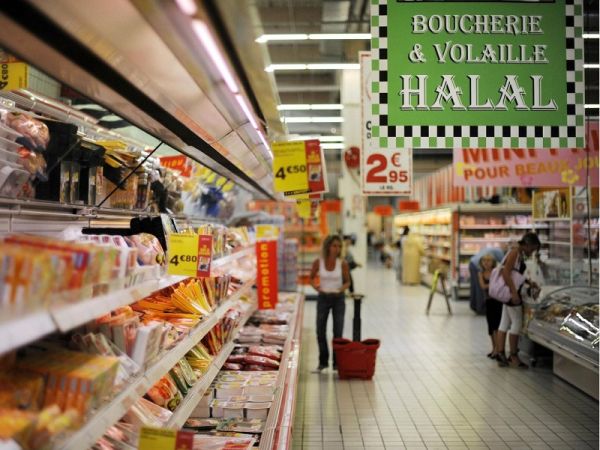
by admin | May 25, 2021 | Halal Food, Halal Industries
 London : Muslims are expected to replace Jews as the second largest religious group in the US after Christians by 2040, according to a new study.
London : Muslims are expected to replace Jews as the second largest religious group in the US after Christians by 2040, according to a new study.
There were 3.45 million Muslims living in the US in 2017, and Muslims made up about 1.1 percent of the total US population, said the report from US think tank Pew Research Centre (PRC). “Muslims in the US are not as numerous as the number of Americans who identify as Jewish by religion, according to our estimate,” however the US Muslim population will grow “much faster” than the country’s Jewish population, it said. In 2007, when the study was first conducted by PRC, the body estimated that there were 2.35 million Muslims in the US By 2011, the number of Muslims had grown to 2.75 million.
Since then, the Muslim population has continued to grow at a rate of roughly 100,000 per year, driven both by higher fertility rates among Muslim Americans as well as the continued migration of Muslims to the US. Scott Lucas, professor of American Studies at the Department of Political Science and International Studies, University of Birmingham, told Arab News he believed the Muslim community in the US is “thriving,” particularly in major cities such as New York, Minneapolis and Detroit.
Lucas said: “Some might find these statistics of interest because of the tensions raised around Islamophobia and the anti-Muslim rhetoric that is whipped up by some leaders and some media outlets, but it’s important to emphasize that Muslims are very much a part of America, they are us and we are them. Muslims practice their faith just as many others practice their faith. The media has created an artificial division.”
Lucas added that despite the rhetoric espoused by US President Donald and the resultant rise in US hate crimes, “the day-to-day reality of Muslims remains one largely of inclusion and going about their daily lives as we all do.” The professor added that, in parallel with the growing Muslim population in the US, he expected to see the erection of more mosques and the creation of more halal products and services. He added: “However, remember not all Muslims practice their faith by the book, just as not all Jews eat kosher food. People practice their faith in different ways.” Haroon Latif, director of insights at New York-based research firm Dinar Standard, also predicted an impending spike in demand for halal products in the US.
—HA/OIC-UNA
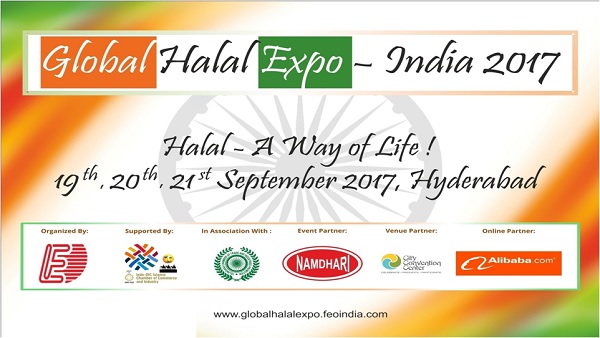
by admin | May 25, 2021 | Business Summit, Events, Halal Food, Halal Industries, Halal Medicine
 Maeeshat Correspondent,
Maeeshat Correspondent,
Hyderabad, Aug 6: The historic city of Nizams, which is also the capital city of both Andhra and Telangana, is all set to host India’s first halal trade expo. With the promise of opening the gateway to over US$ 1.1 trillion market of halal industry, the Global Halal Expo 2017 will be held at the City Convention Centre from 19-21 September.
The Global Halal Expo 2017 will inform the visitors about the benefits and advantages of halal certification and will unlock the true potential of the Islamic market globally.
“The Global Halal Expo 2017 will not only promote trade between the rest of the world and Islamic world it will also create awareness on ‘Halal’ living and the wider concept of halal and its extension to industries besides food & beverages,” says the organizers of the expo which, they say, would showcase the macro and micro fundamentals of a halal economy.
India as a Big Market for Halal
The organizers of the Global Halal Expo 2017 aim to tap the huge potential of Halal industry in India – home to over 172 million Muslims, that is 14.6% of India’s total population. Muslims are the second largest community after Hindus in the country and after Indonesia, India has the second largest Muslim population in the world.
India’s personal care products market was estimated at $43 billion in 2015, and the country’s 170 million Muslims accounted for $4.2 billion of this total. This spend is projected to grow to $7.3 billion by 2020, according to Dinar Standard analysis.
There is a clear demand for halal-certified product, which has promoted the rapid growth of new lines such as Iba Halal Care.
“Bikano, the sweet and the namkeen brand from Bikanervala Foods, has seen a 30% jump in soan papdi and cookies sales in Malaysian market in the last one year, partly due to the halal-certification that gave a higher visibility on retail shelves there,” said Global Halal Expo organizers.
“Halal signifies highest standards of quality and hygiene in ingredients, processes and products,” said Sachin Anand, head (international business), Bikanervala Foods.
“Islam in many ways is a way of life. To that extent, Islamic branding is all about using brands as good deeds. What starts with halal foods, can move on to halal practice in every industry, be it the pharmaceutical or the cosmetic industry. Islamic branding can embrace broader pastures that cover business practices too,” said Harish Bijoor, CEO of Harish Bijoor Consults.
Homegrown brands like CavinKare, Daawat, Bikano, Goldwinner oil, Vadilal ice cream, Amrutanjan Health Care and Gujarat Ambuja Exports are embracing halal-certification to get a better foothold in markets
Why Visit Global Halal Expo 2017?
The halal trade expo plans to connect visitors to some of the key decision makers of the industry, industry leaders and members and help them avail the best networking opportunities with Manufacturers, Importers and Exporters, Distributors and Wholesalers, Retailers, Suppliers, Hypermarket & Supermarket, Hoteliers and Restaurateurs, Department Stores, Governments, Groceries and Convenience Stores, Professionals, Investors, Financial Services Industry, Banking Institutions, Government Institutions and Business & Trade Associations.
Date & Time:
19th September: 5.30 pm. to 8 p.m.
20th & 21st September: 10 a.m. to 8.00 p.m.
Venue:
City Convention Centre, Nampally, Hyderabad
Website: http://www.globalhalalexpo.feoindia.com/index.php
For Bookings & Enquiries:
To get connected with the team of Global Halal Expo 2017, for stall bookings or any further information, one can get in touch with their representatives on contact numbers listed below
Mr. Mohsin
Fair Exhibition Organisers
Mob: +91 9892256824
Tel: +91 022-65203259
Email: prathamesh@feoindia.com
enquiry@feoindia.com

by admin | May 25, 2021 | Halal Food, Halal Industries, Halal Medicine

Rushdi Siddiqui, CEO of Zilzar Tech, Chairman of Zywary Foundation
By Rushdi Siddiqui,
Climate change is destroying our path to sustainability. Ours is a world of looming challenges and increasingly limited resources. Sustainable development offers the best chance to adjust our course. Bai Ki Moon, Secretary General of United Nations.
 Sustainability may be the missing link in the cross-sell of Muslim Lifestyle Marketplace verticals to non-Muslims and up-sell to the discerning and demanding Muslim Millennials.
Sustainability may be the missing link in the cross-sell of Muslim Lifestyle Marketplace verticals to non-Muslims and up-sell to the discerning and demanding Muslim Millennials.
In the span of last two weeks, I presented/moderated at two events in Malaysia and Singapore, Responsible Finance and Middle East-Asia Islamic Finance Congress, respectively, and we may be seeing the beginning of the enlarging narrative for the collateral based, prohibition oriented and negative screening $1.5 Trillion Islamic finance industry.
After 40 years, it seems that Islamic finance may have reached its stage one natural ceiling on growth, expansion, and traction. Thus, a self-disruption, or the more diplomatic term of ‘innovation,’ needs to take place. The disruption is not a new product or structure off of the commonly utilized (read: excessive) commodity Murabaha, but something that’s need to be more transformational to pierce the ceiling into stage two: SUSTAINABILITY.
From dictionary.com:
Sustainability: Environmental Science. The quality of not being harmful to the environment or depleting natural resources, and thereby supporting long-term ecological balance.
Some questions:
Will sustainability expand and extend the Islamic finance narrative?
Will sustainability result in cross sell of Islamic finance to non-Muslims and up-sell to Muslim Millennials?
Will Sustainability inject ‘responsible’ finance into Islamic finance?
Lets start the conversation of sustainability and several verticals of the Muslim Lifestyle marketplace.
I have not included $1 Trillion plus halal food/beverage/ingredients, second largest vertical after $1.7 Trillion Islamic finance, as that requires a stand-alone article, but needs to be aligned to ‘organic,’ an inter-changeable word of Sustainability.
Halal Tourism
Is today’s halal tourism enough for Muslims? Yes, but… The MasterCard-Crescentrating Global Muslim Travel Index (GMTI)- launched in 2015 and updated in 2016- provides the lay of the landscape for Muslim and non-Muslim friendly country destinations. Thus, halal hotels, halal restaurants, etc., are two of many metrics used in GMTI in ranking country destinations. But, we need to look ahead for next 5-10 years, as Muslim friendly/halal needs to be combined with our responsibility as stewards of the planet Earth. We need to leave it in a better shape/place than we found it.
Thus, the halal hotels/resorts should also be sustainable (eco-friendly), where the hotel infrastructure and amenities are aligned to be Earth friendly. For example, water efficient hotel shower heads, wooden furniture from responsible ‘de-foresting,’ meaning planting trees for every logged, bed sheets/comforter from responsible certified suppliers/factories, mini-fridge stocked by local suppliers/farmers, etc.
Thus, halal food, alcohol free premises, separate timing for men/women swimming pools hours, ceiling direction for Kibla, prayer rug, etc., serves the Muslims, but, combining with eco-sustainability serves humanity. It’s the ‘walk’ of the halal tourism talk.
If a halal sustainable hotels can be financed Islamically or refinanced Islamically (assuming economically makes sense), then the spark of commencing convergence.
For example, Muslim majority countries like Maldives, Malaysia or Turkey are probably best situated to pilot a ‘sustainable halal friendly hotel’ project.
Halal Cosmetics
There is a natural alignment between sustainable (eco-friendly) and halal cosmetics, meaning both are generally free from animal testing, animal ingredients, alcohol, etc. For example, halal cosmetic items like lipstick, blush, make-up, etc., if halal label is removed, it could be positioned to non-Muslims as eco-friendly.
Again, it’s about the narrative that connects.
A 2015 story from India (Source: The Times of India, 4 September 2015, http://timesofindia.indiatimes.com/india/Halal-cosmetics-brand-sets-up-shop-in-Gujarat/articleshow/41645488.cms) is about “Iba” (a brand from Ecotrail Personal Care), a startup by two Hindu sisters, Mauli and Grishma Teli, and first halal cosmetics to be launched in the country. The sisters realized that India has the second largest Muslim population after Indonesia, and large percentage of their customers are non-Muslims who buy the halal cosmetic product because they are vegan, cruelty free and free of harmful chemicals.
Iterating again, it’s also about the narrative for the cross sell, where the emphasis is on the process and ingredients.
Halal Pharmaceutical
The USD76 billion halal pharmaceutical industry is of equal importance (to halal food and cosmetics) as it is about Muslim intake, ingestion or injection. The demand has been growing over the years and as a result the first standard for halal pharmaceuticals was created in early 2011, Malaysian Standard MS 2424:2010 (P): Halal Pharmaceuticals: General Guidelines, to cater to the pharmaceuticals industry’s supply chain from processing to handling, packaging, labeling, distribution, storage and display of medicines and health supplements.
Would the above description and standards qualify as part of sustainable pharma? May be, the halal pharma standards can provide guidelines to the sustainable pharma industry because it hits most of the touch points. Thus, halal pharma can actually lead the sustainable pharma industry.
This may be one of the important ingredients for establishing sustainable halal medical tourism/wellness in places like Malaysia, Indonesia, Turkey, and even India. Thus, the sustainable ‘ingredient’ becomes the ingredient as a pull factor.
Modest Fashion
Modest (Muslimah) fashion needs to be Sustainable! What does that mean?
The Muslim lifestyle includes the third largest vertical, the USD224 Billion modest fashion sector. Today, the existing markets are mature and saturated, as a result, international brands are targeting Muslim women with income and demand for modest fashionable wear.
NOTE: Muslim women are the trend-setters and (below-mentioned) designers are the trend spotters.
For example, internationally, designers are embracing the Muslim patrons with campaigns and collections geared towards Muslim lifestyle. Dolce & Gabbana, DKNY, Mango and Uniqlo are some of the examples. For example, Donna Karan debut DKNY’s first ever Ramadan Capsule Collection with its own hashtag #DKNYRamadan. The collection is longer, more modest silhouettes and dusty hues are modelled by Middle East fashion personalities such as Yalda Golsharifi and Tamara al Gabbani. Spanish fashion chain Mango, launched a new Ramadan collection in une 2015. The collection will consist of mainly evening wear for women. Mango has been creating Ramadan collections for its Muslim shoppers in other parts of the world for some time now. Uniqlo, a Japanese company teamed up with Hana Tajima for the Hana Tajuma Life Wear collection that she designed which includes hijabs and Muslimah fashion.
But, two important questions to ask the modest fashion industry:
Are your products manufactured in factories free of child labor? Women get regular breaks? Bathrooms are proportionate to number of occupants? Food available has nutrition value?
Does modest fashion clothing end up cluttering landfills? Do sellers have policies in places where ‘pre-loved’ hijabs, jubas, shawls, etc., can be collected and distributed to girls/women in villages or other countries?
Today, Muslim fashion modest designers do not have the brand name recognition of a Uniqlo, DKNY, etc., but their approach on where sourced/stitched and how pre-loved items are disposed makes for sustainable leadership. Yes, it may cost a little more, but it’s an investment in the people in the supply chain.
Conclusion
Sustainability surely cannot be only a ‘feel-good talking topic’ at Islamic finance events, it needs to be agenda item for execution.
In the 21st century, I think the heroes will be the people who will improve the quality of life, fight poverty and introduce more sustainability. Bertrand Piccard.
Are there other examples of convergence opportunities between Muslim Lifestyle marketplace verticals and Sustainability.
A global e-commerce platform for sustainability products has been established in Malaysia, a start-up called: www.globalecomall.com
(Rushdi Siddiqui, CEO of Zilzar Tech, Chairman of Zywary Foundation.)












